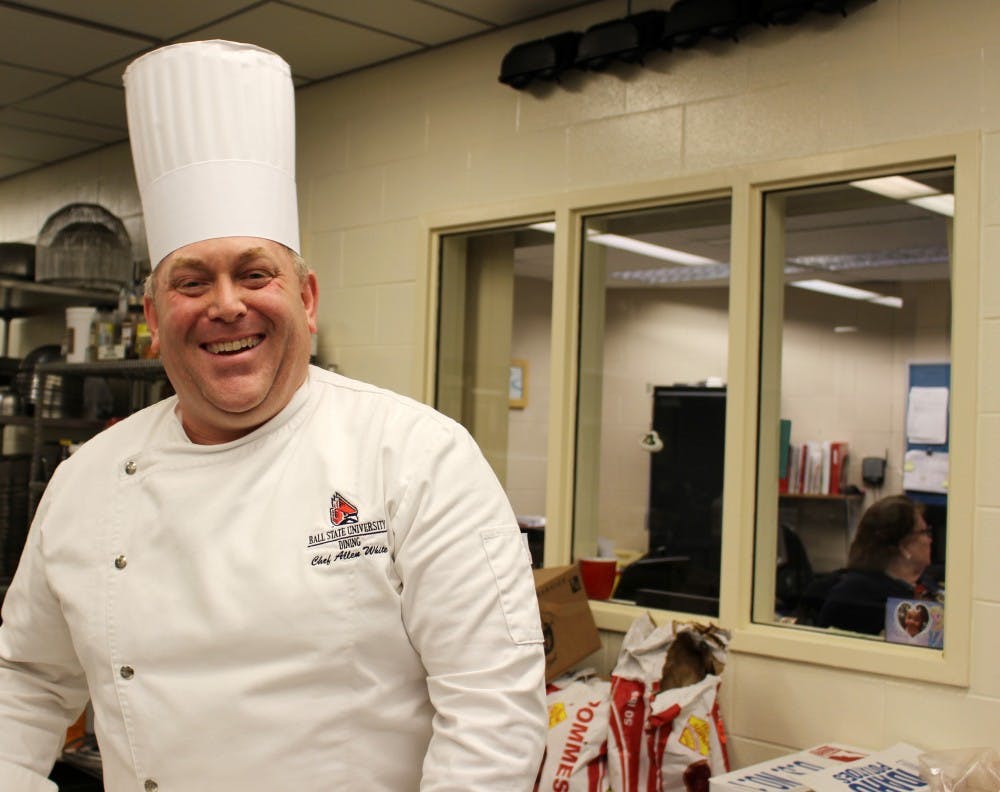When Allen White’s father retired from Ball State in 1996, he had no idea he would become one of the two original on-campus chefs just a year later.
After working in a hotel as a chef, White decided he wanted to make a change and get a new job. He looked through a trade magazine and saw an ad from Ball State looking for a chef. Without his parents knowing, he sent in his résumé and got the job.
White’s role as the Noyer Centre chef is more than just cooking; he plans the menus, orders food and makes sure the staff is following the recipes and using safe food practices. The food is mostly prepared by the dining staff, but White’s direction is still being followed.
“I do a little bit of cooking still, but not as much as you would think.” White said. “I don’t want to take credit for them, but they’re following my direction … when you come to eat dinner and you have meatloaf, macaroni and cheese and green beans, that’s me putting the menus together so if things don’t quite work together, then we’ll change those.”
Making sure food isn’t being wasted and portioning are two important aspects of Ball State dining. Karen Adkins, director of dining services and initiatives, said one of the major reasons Ball State has chefs is to adhere to the recipes and quality of the food served.
“Chef [White] went to school and trained as far as cutting vegetables and all that, so we want to make sure that we’re doing things efficiently and that our quality is there, so that’s part of chef’s job,” Adkins said.
White’s previous jobs meant holidays and weekends were the busy time, but when he started at Ball State, students were away for break. The cooking staff at that time mostly consisted of homemakers.
“My first Christmas and New Year’s I was spinning circles in the living room … I felt like I should be doing something,” White said. “During the breaks, I came to work and I went through all the drawers and I took every single knife, everything out that I didn’t want them to have while they were gone and then I replaced them with the three knives that I wanted them to have.”
Today, part of White’s job is still teaching dining employees how to cook. Especially at holidays, White is frequently asked about recipes and menus by housing and dining employees, who take what they learn at Ball State and incorporate it after they leave campus.
“A lot of our folks that are actually doing the food production, they’re not cooks when they get these jobs. Chef’s teaching them how to cook,” Adkins said. “His job is very instrumental with them here at work and also in their personal lives.”
White spends time making sure the dinner served in the homestyle line isn’t repeated in the Retreat. The Retreat’s menu will soon undergo slight changes to make sure the presentation of the food flow in a way that makes sense on a plate.
“You can put two foods together but if they don’t go together, they don’t fit, they don’t taste good. It’s really finding that blend of two or three foods that go together to make a nice menu,” White said. “It’s really a puzzle.”
White said he is always happy to take suggestions, which can be given by email or comment cards in the dining hall. He enjoys interacting with students and will go out onto the food line and ask students how their food tastes.





